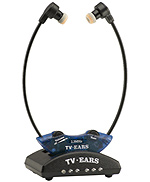5/4/2010 – George J. Dennis –

My company, TV Ears, specializes in sound. We manufacture TV listening products that have helped more than one million people hear the television more clearly. The idea came about after I tried to find something for my dad that would help him hear the TV. Nothing helped, so I created TV Ears in 1998. My father taught me that hearing is a privilege, and listening should never be taken for granted.
While developing the company, I learned a lot about listening along the way and it’s become the cornerstone of my management philosophy. When seeking inspiration, I look to the people around me – both our employees as well as folks that I run into at my local coffee shop or restaurant. They all have ideas and insights and are more than willing to share them to those who are willing to take note. I would submit that an executive’s greatest asset in growing their business is their ability to listen; the absence of doing so is akin to living in a bubble, where reality becomes a precious and elusive commodity. I would highly recommend other executives do the same. Here are some ways I’ve found to make this part of my leadership style.
Really hear your audience
We might think we understand someone’s request or problem, but far too often we get too caught up in our own agenda to really get from where the individual is coming. We’re quick to deliver answers, rushing in with action items and PowerPoint presentations, and might miss the mark because the one thing we forgot to do is simply listen to them in the first place. That’s why it’s important to stay in the moment instead of thinking about how you’ll respond while the other person is talking. Hear and understand the need, let it soak in and then answer the call.
Walk a mile in their shoes
Active listening helps promote a dialogue, not just a monologue. Put yourself in the position of the person talking, and really think about what you would like that person to do. It’s easy to jump in and cut people off in the middle of their sentence, but that’s not the way to gain confidence from employees or potential customers. Wait until the person is finished speaking and then repeat words back to let them know you are fully engaged in conversation.
Think about body language
Listening is not just a passive act. People need nods, eye contact and a reaction to really feel heard. We all know how uncomfortable it is when the audience is looking at their watch, fidgeting or avoiding eye contact while you’re speaking. The old adage “more than half of all communication is non-verbal” definitely rings true when listening.
You remember good listeners; especially how they made you feel. It might seem like second nature, but it takes work to be good at it. At TV Ears, we pride ourselves on talking-the-talk and walking-the-walk when it comes to hearing and adapting to our customers’ needs. I truly believe we wouldn’t have such a strong reputation for quality and performance if we didn’t have such a dedicated staff of good listeners.
About the author: George J. Dennis is the founder and CEO of TV Ears, fast-growing manufacturer of doctor recommended TV listening solutions. He can be reached at gdennis@tvears.com.
HT: Fast Company

